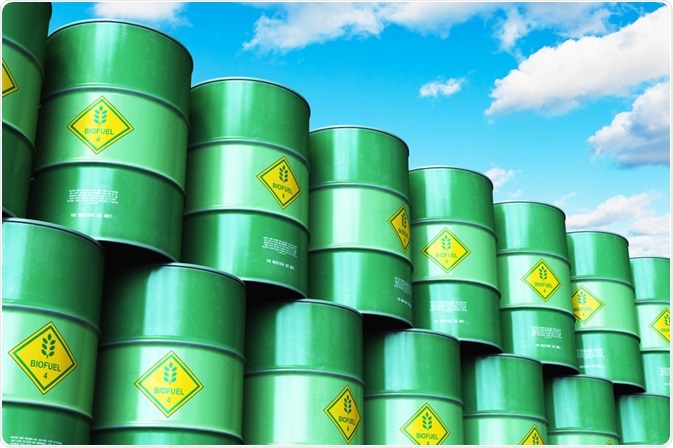Combating climate change requires several approaches in multiple industries. One key piece of this puzzle is the question of how we fuel the myriad of automobiles, trucks, and industrial processes that power the modern world. Biofuel is one solution to this issue and microbes are playing an increasingly important role within the production of this alternative fuel source.

Image Credit: Oleksiy Mark/Shutterstock.com
Vehicles, Industry, Oil, and Climate Change: A Pressing Issue
Since the Industrial Revolution of the late 18th century, humankind has seen dramatic advances in technology and the standard of living and a consequent population explosion. However, this progress has not come without its damaging effects. We are now seeing a warming earth with the increased incidence of extreme weather events, a loss of habitat and species on a scale never seen before, and the problems of an overpopulated world.
Ever since the late Victorian era, the main fuel source in the industry has been fossil fuels. In the early days of the automobile, there were alternatives such as steam-powered automobiles and primitive electric engines. However, neither of these could compete with the efficiency and cost of using oil, specifically petrol and diesel.
For the entire 20th Century, the internal combustion engine held sway. However, as the evidence for human-led climate change became overwhelming, and especially the role of the automobile industry within it, it became apparent that alternative means of powering our world were urgently needed.
Fossil fuels are the prime driving force behind climate change due to the massive amounts of CO2, the main greenhouse gas, that are released worldwide (around 38.1 billion tonnes in 2019.) Vehicle exhausts are also the main cause of smog and pollution in cities worldwide, which has a hugely damaging effect on the health of people who live in them.
The End of Oil?
There is also another pressing existential issue with fossil fuels. Because they are a finite resource that cannot be replaced, at some point in the not-too-distant future reserves will simply run out. At current rates of reserve depletion, it is widely predicted that oil will run out in the mid-21st Century, and coal will run out by the end of this century. This is within most of our lifetimes.
Solutions need to be found to these issues and moving away from fossil fuels toward alternative fuels and sources of energy will play a key part in them.

Image Credit: Maksim Safaniuk/Shutterstock.com
Biofuel – A Part of the Solution
Biofuel is produced from living organisms and their waste. Ethanol, a commonly produced biofuel, is made from plants in the same way as the ethanol produced for alcohol. Some of the main plants used in ethanol production are sugar beet, corn, and sugar cane, due to the large presence of sugar which can then be easily fermented by microbes such as the yeast Saccharomyces cerevisiae.
Biofuels have a vastly reduced impact on climate change compared to fossil fuels. Studies have shown that biodiesel reduces hydrocarbon emissions by 75-90% and using it instead of diesel reduces emissions of carbon monoxide and smog-producing particulate matter by around 50%. It also eliminates all sulfur emissions.
However, biofuels are not perfect. It is expensive to convert plant material into useable ethanol. Also, there are ethical considerations. Large amounts of land must be used to produce fuel, which reduces the land available for food production, which is a problem in developing countries with large populations to feed. The amount of land needed also threatens vital ecosystems: In Brazil, there is a very real concern that rainforest will be cleared to grow sugar cane for this growing demand.
It is therefore argued by many scientists that producing biofuel in this manner is not a viable long-term solution to replace fossil fuels. Clearly, a better way is needed.
Using Microbes to Produce Better Biofuel
Micro-organisms are the subject of particular focus in several different scientific fields. They are abundant in most environments on earth and their use is driving a small but significant technological revolution. Microbes are being used to produce ethanol for biofuels which is produced from lignocellulose, a mixture of cellulose, hemicellulose, and lignin, which make up the plant cell wall.
The enzyme which breaks down cellulose is cellulase. Scientists have been investigating sources of this enzyme in several microbial species in diverse environments. Some of these environments are unusual, including the stomachs of termites, and soil found near volcanoes.
Sulfulobus solfatarticus is an archaeon found in volcanic pools near Mount Vesuvius. Researchers have recently been experimenting with genetic modification to improve this microbe’s ability to produce the necessary enzymes.
The fungus Trichoderma reesei is found in soil globally. It feeds by secreting significant quantities of cellulase. Originally discovered during WWII, this fungus was responsible for “jungle rot” which broke down the cellulose in tents and uniforms of US soldiers. A Canadian company has genetically modified the fungus to produce larger quantities of cellulase and convert straw into glucose, which can then be turned into ethanol. They have managed to convert 75% of the straw into glucose.
Another possible solution is algae. These use photosynthesis to turn carbon dioxide into sugar, which they then use to produce lipids. Using small-scale laboratory bioreactors, scientists are using the lipids to create biodiesel and algal carbohydrates to produce bioethanol. If they can scale it up to industrial levels, the use of algae to produce biofuel may become a large part of the mix.
There is also the problem of waste. As the plant material used is inedible – for example, straw – this is reduced. A microbial system to produce biofuel is therefore less wasteful, more ethical, and cheaper. It also provides a significant reduction in greenhouse gas use and emission.
Microbes and Biofuel: Toward a Brighter Future
Climate change, the end of oil, overpopulation, and land use are existential problems for the human race. With innovative approaches such as the use of microbes to produce better biofuels, the mitigation of issues such as these is indeed possible. Much more research will be needed to provide these solutions on an industrial scale, but they are increasingly within our grasp as we move forward.
Last Updated: Sep 8, 2020